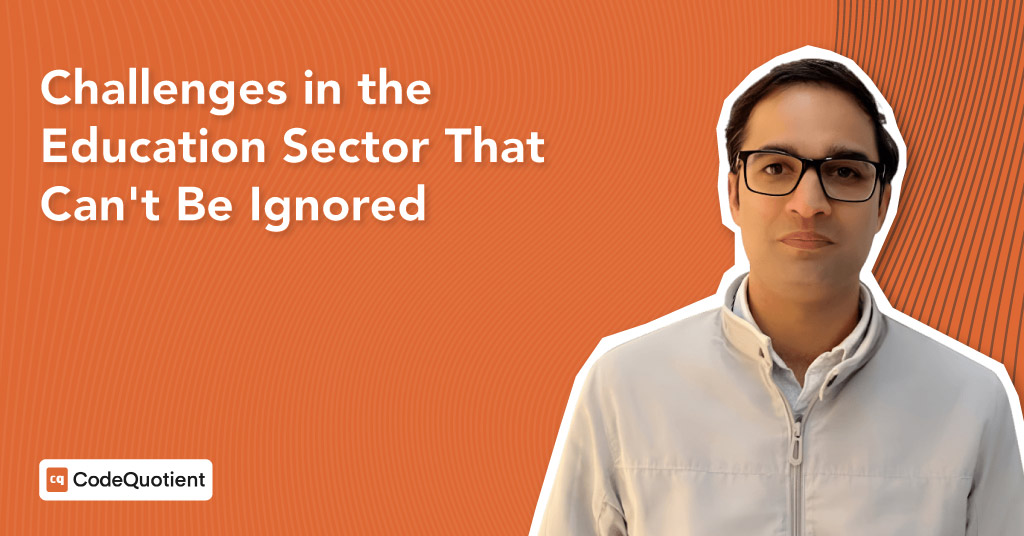The Indian education sector has made significant progress in terms of accessibility and bringing more children into formal education. Yet, there are loopholes and issues that must be resolved to increase its quality and impart real-time skills.
The Economic Survey 2023-34 revealed that only 51.25% of the graduates are employable, highlighting the gap between education and market demands. The fact that one in two graduates is not readily employable underscores the need to align classroom teaching methods with industry requirements.
What are the other pressing challenges in the Indian education sector? What steps are needed to bridge the skill gap between graduates and industry demands? Let us take an elaborate look.
Top Challenges in the Education Sector
As the CEO and Founder of CodeQuotient, I believe these are the most pressing issues in the education system.
1. Mismatch between education and industry needs
Though there is a notable increase in the enrollment ratio and the number of educational institutions, a majority of graduates lack the skills demanded by the industry.
For instance, a National Skill Development Corporation report shows that there was a supply shortage of 29 million skilled workers in 2022. On the other hand, 29% of graduates remained unemployed. This reflects the mismatch between the skills possessed by the graduates and those demanded by the industry.
2. Outdated curriculum
Advanced technologies are evolving at an unprecedented pace. The skill profiles and industry demands are constantly changing.
In India, education courses are highly structured and have a rigid curriculum. The system finds it difficult to keep up with ecosystem changes and update the curricula in a timely manner. In many institutions, the curriculum remains unchanged for decades.
As a result, the educational courses fail to impart an understanding of real-world problems, knowledge of emerging industries, and evolving skill requirements. The country needs forward-thinking curriculums that foster holistic skills and knowledge in multiple disciplines among students.
3. Lack of personalization
Every student has unique strengths, interests, learning styles, and pace. The curriculum, teaching, and assessment methodology remains uniform across the universities in the country.
The schools and universities follow a one-size-fits-all approach and there is no room for personalization. When students are taught following methods that do not match their intelligence level and learning styles, they feel disengaged in academics and lose their individualism. A higher degree of personalization would kindle their curiosity and desire to learn and excel.
4. Limited hands-on exposure
The education system is predominantly conceptual and textbook-based. While it is essential to impart theoretical knowledge, students must also learn to apply them in solving real-world problems.
Many educational institutions need more infrastructure and laboratories to provide hands-on training. There is a greater focus on rote memorization and academic scores.
Solving the Challenges: Way Forward
Enhancing the education quality is crucial to improving the employability skills of the graduates. Here are some suggestions:
1. Revamp the curriculum
The curriculum should be updated periodically to reflect the industry’s demands. It should be revised to align with the skill and knowledge requirements of emerging technologies like AI, data science, cloud computing, etc.
2. Focus on industry-readiness
The current education system is majorly focused on marks. Shifting the focus of teaching, learning, and assessment towards outcomes like industry- and job-readiness helps bridge the skills gap.
This remains a core principle at CodeQuotient, where our focus lies predominantly on enabling students to get a job rather than just a degree.
3. Promote industry-academia collaboration
Fostering partnerships with industry helps impart relevant skills. Exposing the students to real-world problems through internships, industry projects, and mentorships enhances their job readiness. Collaborating with the industry offers valuable insights on emerging technologies, which in turn helps align the curriculum with the current market trends.
4. Experiential learning
Engaging students in activities like simulations, laboratories, fieldwork, etc. allows students to experiment with their classroom learning. Such practical methods play a crucial role in reinforcing theory. They improve student’s confidence, problem-solving skills, and critical thinking abilities.
5. Adopt personalized learning methods
Personalized learning methods help tailor the curriculum, teaching style, pace, etc. to match the specific interests of a student. Such methods kindle student’s curiosity and creativity while keeping them engaged and motivated.
Closing Thoughts
The Indian education system needs a complete overhaul. Outdated curriculum, misalignment between education and industry needs, and limited practical exposure are hindering the true potential of students.
Overall, the system should shift its focus from marks and degrees towards imparting real-world skills and industry-readiness. This requires concerted efforts from academia, industry, students, policymakers, etc.
Industry-academia collaboration is the need of the hour. It helps impart industry-relevant skills, hands-on exposure, and problem-solving abilities that ultimately enhance the student’s employability.
While there are a lot of learning platforms that offer industry training and mentorships, students must evaluate the courses, instructor credentials, and outcomes before choosing one.
A comprehensive effort and strategy to modernize the curriculum and industry-academia collaboration can upgrade the Indian education system on par with global standards.




